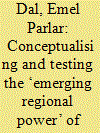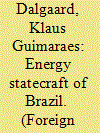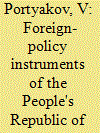| Srl | Item |
| 1 |
ID:
146660


|
|
|
|
|
| Summary/Abstract |
Turkey has thus far been generally neglected in most IR studies on power categorisations, such as middle or middle-range power, regional power or rising/emerging power, despite its rising regional power status in the past decade. This paper attempts to understand Turkey’s regional power together with its rising power status using an integral approach. In doing so, it empirically tests whether or not Turkey fits Daniel Flemes’s ‘regional power’ category, which seems to be proposing a more complete and integral framework through the fulfilment of four basic preconditions: claim to leadership; possession of necessary power resources (material and ideational); employment of material, institutional and discursive foreign policy instruments; and acceptance of leadership by third parties. Based upon these analytical tools, the article will discuss Turkey’s performance in creating a regional impact in its neighbouring regions of the Middle East, the Balkans and the Black Sea and Caucasus.
|
|
|
|
|
|
|
|
|
|
|
|
|
|
|
|
| 2 |
ID:
153545


|
|
|
|
|
| Summary/Abstract |
This article evaluates the use of energy resources as instruments of foreign policy, herein termed “energy statecraft.” While most attention has been given to traditional energy resources such as oil and natural gas, few studies concern themselves exclusively with energy statecraft using renewable energy. The Brazilian case is unique because it is the only country to pursue energy statecraft with biofuels, and it does so through soft power, by encouraging mostly African countries to emulate its experience with biofuels. To inform this analysis, this study draws on the “conditionalist” approach in the economic statecraft literature to create a theoretical framework. While this approach establishes the conditions under which economic instruments of foreign policy are likely to be effective, this article applies these conditions to energy resources as foreign policy instruments, focusing on biofuels. However, the efficacy of energy statecraft cannot be fully understood without considering both the international context in which it takes place and the domestic context of target states. This article concludes that a theory of energy statecraft must consider three main factors: the conditions in the sender state, the domestic contexts of target states, and the international energy context.
|
|
|
|
|
|
|
|
|
|
|
|
|
|
|
|
| 3 |
ID:
107277


|
|
|
|
|
| Publication |
2011.
|
| Summary/Abstract |
The article analyzes the renovation process of the foreign-policy instruments of the PRC during the past twenty years. It examines in detail such trends as the policy of partnership proclaimed and implemented by Beijing, which is addressed to most countries of the world, and the policy of good-neighborliness towards the states bordering on China on land and sea. The author also discusses the shifts in the PRC positioning in the UN and the evolution of its approaches to the proposed reform of this organization.
|
|
|
|
|
|
|
|
|
|
|
|
|
|
|
|